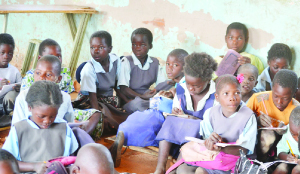
•Two classrooms and a single multipurpose office are what constitute the entire Lunjovwa Community School.
By SAM PHIRI –
ABOUT 340 kilometres from Lusaka deep in the Central Province is an incredibly gloomy school lifestyle which when told would easily be cast aside as fable.
This is at Lunjovwa community school, situated in the depth of Chibombo District.
At this school, that accommodates 310 pupils, vulnerability is clear among children struggling to get a fair share of literacy from eight untrained volunteer teachers working for almost nothing per month.
While the outer walls of this block look fairly painted, the inside is a sorry sight as the entire school only has three racked desks barely balancing on a badly ragged dirty floor.
During normal class time, these pupils sit on this bare dusty floor and make use of their laps as desktops.
Sometimes, pupils would sprinkle water to lessen the emission of dust in the classrooms creating a preference of sludge.
The few ‘birds’ that would report early would chance a plank from old damaged desks that they would set on blocks to at least get token comfortable sitting position.
“We don’t have desks, this plank is actually better than sitting on this bare cold floor in the morning.
As you can see, there is only one desk which is also broken in the corner used by the class monitor,” one pupil said pointing at the only wrecked and imbalanced desk.
The health of the children cannot just go unquestioned in these classrooms as dry coughs mainly due to the dusty nature of the classrooms are commonplace.
All seems normal for both teachers and children learning in these classrooms though under the strict safety regulations, the school would have been closed.
One wonders when last authorities passed thorough to inspect the safety standards at this school.
The school is situated few metres off a bumpy dusty road where traffic rules of keeping the left lane are not followed.
Poverty levels loom large here as visibly seen in the school-going children and elderly alike who would stand still to escort any passing vehicle with a prolonged gaze.
Two classrooms and a single multipurpose office is what constitute the entire Lunjovwa community school.
Children’s faces at this school barely wear smiles when they come face to face with this agonising reality of school lifestyle which they have had to endure for some time now.
They have had no chance of comparing their lives to those in the urban region where choice and preferences are key words.
Many would be seen walking to school in worn-out plastic slippers or barefoot as school shoes are perceived expensive and a luxury.
This is a vivid reason why former permanent secretary cabinet Anne Mwitwa dropped a tear when one of the parents led her to Lunjovwa to see what children were going through in her home village.
“This is my homeland and, seeing what my sisters, brothers and children are going through really touches my heart, school should be enjoyed,” Ms Mwitwa said.
Her compassion did not end at mere empathetic sentiments but rather with a question: “How do I help these children enjoy their education?”
Looking at the number of desks (three) for the entire school population of 310 pupils, the answer was almost immediate – desks!
Ms Mwitwa made a pledge to help improve learning conditions of the pupils and just a few weeks after her pledge, returned to the school with 20 new desks much to the delight of pupils, teachers and parents!
The desks are designed to sit four children each meaning each class will now at least have 40 pupils seated.
Songs and dance of gratitude characterised the handover ceremony of the desks to the school.
The meek Ms Mwitwa whose main agenda was sharing love with the children of the community said she was happy that the children received her gift with appreciation.
“I am very grateful and humbled with the warm welcome and for sharing this momentous occasion with me. Children are just at heart,” she said.
A grade three pupil, Memory Mangote, who dreams of becoming a medical practitioner, thanked Ms Mwitwa for the gesture which she described as selfless.
“We thank you very much for the desks and we promise to take care of them very well, may God bless you,” she said.
Head Teacher of the school, Shareck Chimpilinte, had few but loaded words as he explained: “We have eight teachers here who depend on the money K10:00 children pay per term meaning they have to share K125 per monthly salary each,”
He went on to say: “This is the reason why we could not even think or plan for a single desk. With which money now?”
Mr Chimpilinte believes that what he and other teachers are doing in the lives of these children would soon bear fruit with the support coming forth from well-wishers like Ms Mwitwa.
Ms Mwitwa, who has also promised to work on the floor of the school and the Head Teacher’s office furniture is optimistic that some of the ambitious children coming from that background will one day be eminent personalities in society.






